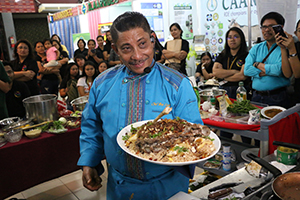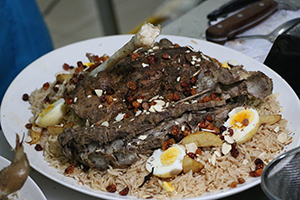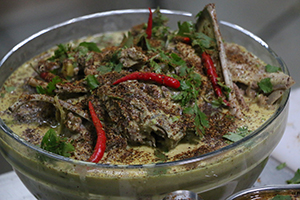 DAVAO CITY – The pungent aroma of middle eastern spices filled the social hall of the University of Southeastern Philippines (USeP) during the cooking demonstration of Pablo “Boy” Logro, the President and Chief Executive Officer (CEO) of Chef Logro’s Institute of Culinary and Kitchen Services, Inc. (CLICKS).
DAVAO CITY – The pungent aroma of middle eastern spices filled the social hall of the University of Southeastern Philippines (USeP) during the cooking demonstration of Pablo “Boy” Logro, the President and Chief Executive Officer (CEO) of Chef Logro’s Institute of Culinary and Kitchen Services, Inc. (CLICKS).
The cooking demonstration was conducted as part of the Halal Goat Farms and Industry Encounters through the Science and Technology Agenda (FIESTA), an event that was held at USeP on October 16-17, 2019.
Logro recounted his days serving the King of Oman as he chopped, blended, toasted, and caramelized ingredients to make one of the King’s favorite: chevon “kabbouleh” or crispy brown rice and chevon salona or Arabian curry.
The halal way of cooking, according to Logro, involved making everything from scratch and following the halal process of slaughtering then cutting the meat. The goat meat, which came all the way from the Sultan Kudarat State University (SKSU), was fall-off-the-bone after being boiled for hours together with cardamom, cinnamon bark, dried chili pepper, cloves, cumin seeds, and the outer layer of red onion. This technique, he said, removes the “anggo” or the unpleasant smell of goat when cooked.
Aside from the two main dishes mentioned, Logro also made garnishes and sauces to demonstrate how goat can be “levelled up” from how we know it is cooked: kaldereta, kilawin, and papaitan, among others. He made green mango chutney and hummus as sauces.
The cooking demonstration neared almost three hours as he made the liquid marsala from scratch – blending green chili, coriander, onion, parsley, tomatoes, lemon juice, olive oil, and ginger – and also making the dry masala by toasting dried chilis, cinnamon, cardamom, cumin seed, turmeric powder, and cloves. The liquid marsala served as the base for the curry, which included goat meat. Meanwhile, the dry marsala served as flavoring for all the dishes made during the cooking demo.
Meanwhile, for the kabbouleh, Logro sautéed onion on ghee and added sugar to caramelize the onions. He cooked the basmati rice in the stock of boiled goat and later after cooking it, garnished it with fried raisins, boiled eggs, potatoes, and sliced almonds.
“We need to increase awareness of halal cooking for it to be passed to the millennials and the younger generation,” Logro said in Bisaya to the student participants from USeP.
FIESTA is conceptualized by the Philippine Council for Agriculture, Aquatic and Natural Resources Research and Development of the Department of Science and Technology (DOST-PCAARRD) as a technology promotion and transfer platform aimed at promoting products if S&T as competitive and profitable business ventures for the micro, small, and medium enterprises (MSMEs) in the agriculture, aquatic, and natural resources sector.
 The Halal Goat FIESTA is held to promote products and protocols of halal goat developed from research and development initiatives of government agencies and state universities.
The Halal Goat FIESTA is held to promote products and protocols of halal goat developed from research and development initiatives of government agencies and state universities.
It is jointly implemented by PCAARRD’s five Consortia in the regions: Cotabato Agriculture, Aquatic and Resources Research and Development Consortium (CAARRDEC) in Region XII; Southern Mindanao Agriculture, Aquatic and Natural Resources Research and Development Consortium (SMAARRDEC) in Region XI; Central Luzon Agriculture, Aquatic and Resources Research and Development Consortium (CLAARRDEC) in Region III; Cagayan Valley Agriculture, Aquatic and Resources Research and Development Consortium (CVAARRD) in Region II; and Ilocos Agriculture, Aquatic and Natural Resources Research and Development Consortium (ILAARRDEC) in Region I.
